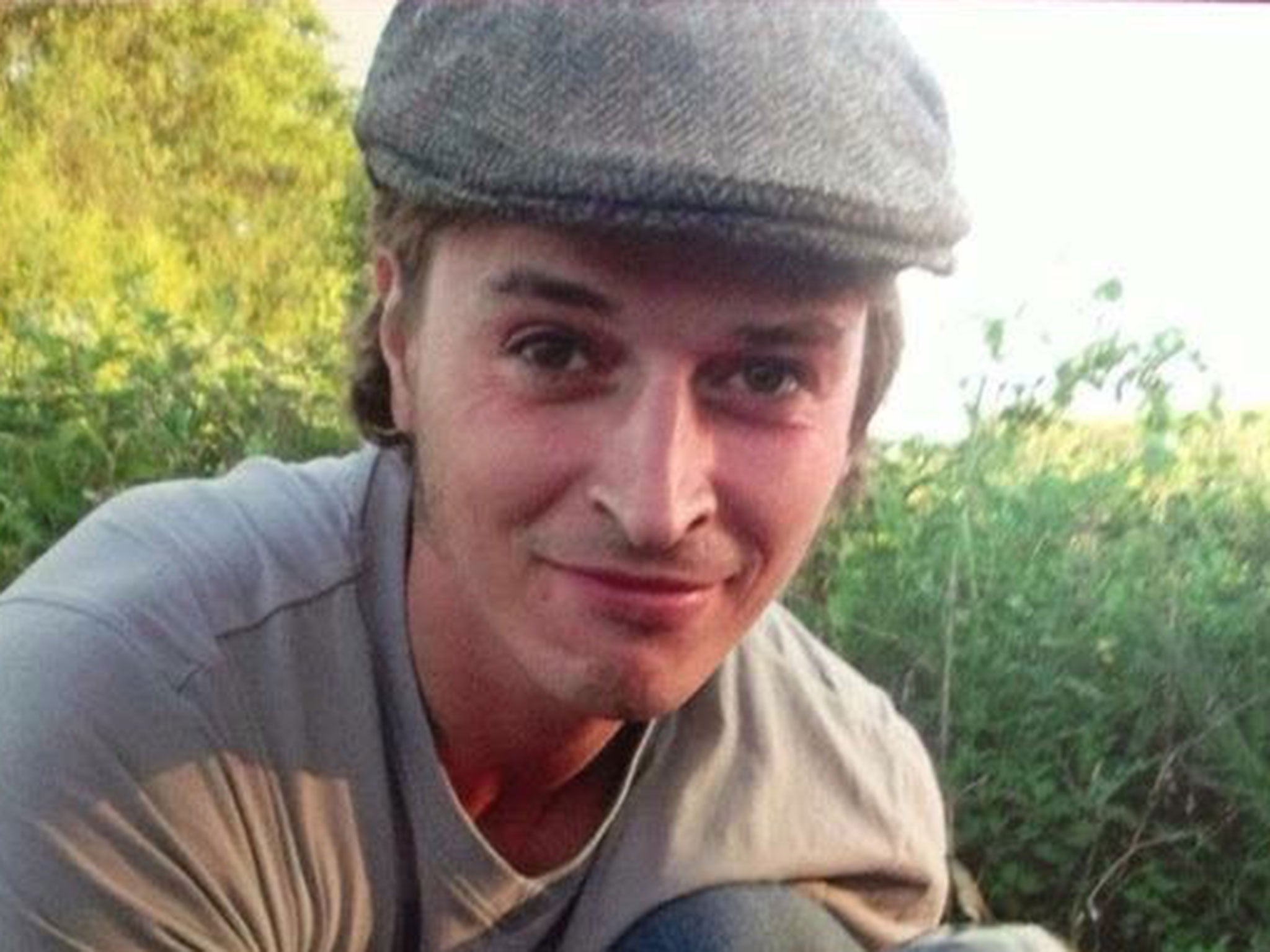Epileptic man died after being restrained by police 'who were warned he was having a seizure'
Misconduct hearing told Duncan Tomlin was sprayed with incapacitant and restrained face-down in handcuffs and leg restraints

Police officers were warned an epileptic man could be having a seizure before wrestling him to the ground, spraying him with incapacitant and restraining him face-down, a misconduct hearing has heard.
Duncan Tomlin fell unconscious in a police van and died three days after the incident in Haywards Heath on 26 July 2014.
Prosecutors decided not to bring charges against five police officers involved and three of them are now facing misconduct proceedings that could see them dismissed from Sussex Police.
Sergeant Christopher Glasspool and police constables Jamie Jackson and Daniel Jewell are accused of “inexplicable” delays in removing the restraints when they realised there was a medical emergency, the force’s barrister told the hearing.
All three deny misconduct and gross misconduct, insisting they acted appropriately.
A hearing on Tuesday heard that a member of the public had called 999 to report neighbours fighting, and officers found Mr Tomlin standing outside at 11.52pm.
His partner, Ann-Marie Botting warned officers he was having or about to have a seizure due to epilepsy but they gave chase, the panel heard.
“His girlfriend told the police he was having a seizure, she shouted at them to stop, but they ignored her,” his aunt told The Independent at the time.

The hearing was told that Mr Tomlin punched PC Russell Watson, who is not being investigated for misconduct, in the face when officers followed him into a nearby road and the pair fell to the floor in a violent struggle.
Mr Tomlin was sprayed in the face with an incapacitant but turned it on PC Watson and was arrested for assaulting a police officer, Sussex Police’s barrister Mark Ley-Morgan said.
Sgt Glasspool, PC Jackson, PC Jewell and two other officers - who are not the subject of misconduct proceedings – then arrived when a call was made for back-up.
Mr Tomlin was restrained on the floor face-down, being handcuffed and placed in leg and thigh restraints while “groaning and shouting”, Mr Ley-Morgan said.
He was carried into a police van with his legs curled up behind him, the hearing in Lewes was told, and CCTV footage from inside showed the officers kneeling on Mr Tomlin's back and legs while he lay on his front.
His last visible body movement - apart from the rise and fall of his chest – was when he moved his hand was a minute and 33 seconds after being carried into the van, Mr Ley-Morgan said.
He was moved on his side three minutes and 21 seconds after being put in the van when Sgt Glasspool became concerned that his breathing was “laboured”, the panel heard.
An ambulance was called but stood down when it was decided it would be quicker to take him straight to hospital.
It was another three minutes and 39 seconds before the first leg restraint was removed and four minutes and seven seconds before the handcuffs and thigh restraints were taken off, the hearing was told. Mr Ley-Morgan said this should have happened “immediately”.
He added: “There is no adequate explanation as to why there was a delay. There was a wholly inexplicable delay (in removing the restraints). We say, an unjustified delay.”
Mr Tomlin was in the van for seven minutes and 31 seconds before being carried out, placed on the ground and given CPR, the panel heard.
Paramedics were called back to the scene while another officer went to pick up an A&E doctor from nearby Princess Royal Hospital, arriving back at 12.26am. He said he was told Mr Tomlin may have taken drugs but not about a possible seizure or epilepsy, the panel heard.
Mr Ley-Morgan added: “Failure (to deal with the situation) is so serious that it amounts to gross misconduct and dismissal would be justified.”
PC Watson said he told Sgt Glasspool what he heard about Mr Tomlin's epilepsy but explained he did not think he was showing signs of a seizure.
Sgt Glasspool, who believed Mr Tomlin was under the influence of drugs and alcohol, is accused of failing to properly assess the situation and take into account the dangers of suffocation.
He admitted it was his responsibility to supervise the incident but denies failing to identify the medical emergency.
Pathologists found traces of recreational drugs Mr Tomlin’s system. They said this and positional asphyxia - where someone suffocates because they cannot breathe properly due to the position they are in - played a part in his death.
Two other officers who were present at the time have also been investigated. PC Watson faced a private misconduct hearing on Friday and was cleared of all allegations against him. PC Alex Bennett resigned before disciplinary proceedings could be brought.
Mr Tomlin’s partner and relatives were dismayed by the Crown Prosecution Service’s decision not to charge officers because it believes there was no “realistic prospect of conviction”.
The Independent Police Complaints Commission (IPCC) separately found a case to answer for gross misconduct against the five officers, triggering misconduct proceedings.
The hearing continues.
Additional reporting by PA
